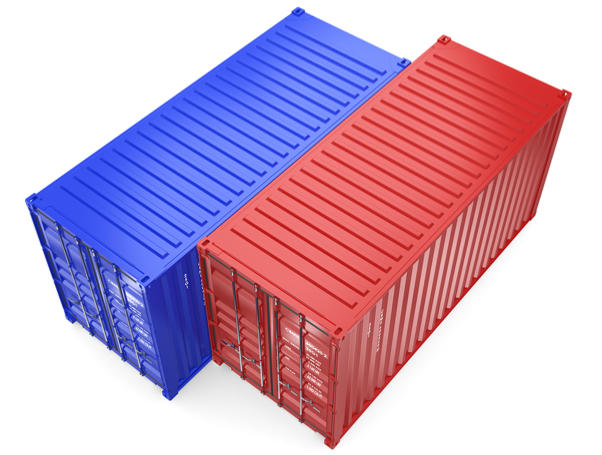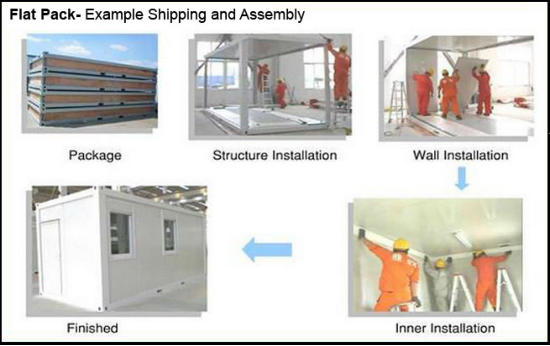The Basic Containers Used For Construction And Storage
ISO Shipping Container 'vs ISO ISBU Modules
This section is not duplicate information. It is, in fact, a clarification of the controversial difference between an ISO Container for use as a Shipping Container and an ISO Container for use as an ISBU for storage or construction.

[Graphics: Green Quest Research]
Additionally, we will address the difference between Maritime and Domestic ISO Containers.
In the past years we've received numerous questions asking the difference between all of the following names:
• ISO Shipping Container
• ISO Container
• Maritime Shipping Container
• Container
• ISBU
• ISBU Module
• Intermodal Container
• Shipping Container- Domestic
• Shipping Container- Maritime
• Conex • Conex Box
• GreenCube
• Shipping Container
• Flat Pack
• Box
• Cargo Container
Which Names Are Correct?
The only incorrect name on the list above is Flat Pack or Flat Pak.
A Flat Pack is not generally an ISO approved Container, nor is it a genuine ISBU module. All the other names are correct and used by various trades and professionals to describe a true ISO Container. We will discuss their uses in more detail later.
Two Categories Of Shipping Containers
There is some confusion, even to some shipping professionals because there are technically two (2) types of legal ISO Containers. These are:
• Maritime Shipping Containers for shipping by sea, rail, or land
• ISBU Modules, for storage or any type of building and construction
The two categories are also divided into Maritime and Domestic containers.
What is the difference?
Here is some detail of the two categories-
First, we must clarify the phrase ISO Container?
Is every ISO Container a Shipping Container? Technically no.
ISO is simply an international manufacturing standard. Almost every type of product, service, or material has an ISO Standard and and classification. [ see ISO organization website ]
It is important to understand better what ISO actually means and that it does not particularly mean or infer Shipping Containers. Millions of products and services also have an ISO Standard, and only a few have anything to do with the Shipping Container industry

ISO everything...
The ISO organization is headquartered in Switzerland and is made up of 163 groups and boards of engineers and scientific professionals from many sectors. They publish more than 21,000 reports, “covering almost every industry, from technology, to food safety, to agriculture and healthcare. ISO International Standards impact everyone, everywhere.” [ quotation ISO website ]
We emphasize, “almost every industry…"
”Technology, Food Safety, Agriculture, Health Care, Manufacturing, Quality Management, etc.
Not just “shipping containers.”
Not only are most products and technologies ISO certified, but also the manufacturing facilities where the products are made… In this case, when a shipping container or ISBU module is manufactured, it must be manufactured in a facility that is “ISO Approved.” The factory and equipment must also be ISO certified, not just the “shipping container” itself.
ISO Certification means your products are created according to the same ISO quality standards every time and everywhere in the world.
So then, an ISO Container could be anything from a laboratory bottle to a dumpster… In this situation, we discuss a specific type of ISO Container for shipping cargo, storage units, and building construction. The ISO Container number we want to discuss is ISO/TC 104/SC 1. Even though the world has many other types of ISO Containers, this is our specific category.
ISO Container #ISO/TC 104/SC 1 is a type of steel cubes 8’ wide and various lengths, strong enough to carry tons of load internally and tons of load externally.
ISO Container #ISO/TC 104/SC 1 is then inspected at the factory and certified with a CSC-Plate and Container Identification Number (CIN) stamped into the steel post inside the steel module.
Unless a steel module passes this stringent certification process, it does not qualify to be an actual ISO Container #ISO/TC 104/SC steel module.
Two Types of #ISO/TC 104/SC ISO Containers
Maritime Containers are the more typical category, which are engineered and certified for use on ships to stack ten (10) containers high when fully loaded. These are generally limited to the 20’ and 40’ lengths with standard widths. They can be used on ships, rail, trucks, land, and stacked ten (10 high). Both are used as Shipping Containers and ISBU modules, but their primary purpose when they are originally manufactured is to be used for Shipping Containers.
Domestic Containers are the second category, which are not engineered quite the same as the Maritime container, although they could be.
The principal difference between a Maritime or Domestic container is they are still very strong and have the same exact dimensions as Maritime containers; however, they are typically engineered and certified to be stacked three (3) high, ‘vs ten (10) high for a Maritime container.
The Domestic type are typically 20’ containers or ISBU, usually fabricated locally in each country or region. Their principal intended use is for either ISBU modules or for use in Domestic shipping and logistics on truck or rail. Thus, their only certification is to withstand loads of three (3) containers high.
There are also two basic types of Domestic containers:
1) An ISO Container that is older, and does not quite meet the CSC inspection standards yet is still in good condition and good structural strength integrity.
This type Domestic container can still hold cargo, or it can be used for storage or building construction, but can only be shipped via truck and possibly rail.
2) A noncertified container that looks like an ISO Container has the ISO type corners, posts, and frame, either newly fabricated or fabricated from a pre-manufactured type “Flat Pack.”
This type of Domestic could actually be the same strength or stronger than a Maritime. It could look like a Maritime container in every way, but unless it passes the CSC inspection it would be excluded from any Maritime and probably rail use. It can only be shipped by truck.
This type of Domestic container is generally fabricated for a specific use, such as a storage unit that is mobile or as an ISBU type Domestic for many types of construction purposes, including modular construction projects. These are generally created and/or certified by a local engineer.
The Domestic ISBU modules are growing in popularity due to their lower cost and local fabrication yet very sufficient structural strength for use as an ISBU module and modular construction projects. The benefits of local construction, quick fabrication, and more flexibility are a significant plus.
Why Use Domestic ISBU Modules?
Since 2006, our ISBU Association has been aware of numerous projects globally that could not obtain enough ISO Containers quickly enough to meet their construction schedules.
Very often, there are shortages in some regions of many countries. Even in the United States, there are areas with many containers and the other regions with none. The cost and time to get the containers into the proper locations are often prohibitive.
Fabrication with local steel or Flat Packs has become realistic for many companies and projects globally. The Flat Packs or Container parts are sent within days instead of weeks and months. This system of “local fabrication” for modular construction is often more profitable overall.

[Photo: Box&Box]
Domestic ISBU modules, ISBU Hybrids, and Flat-Packs
A local Engineer is consulted to be certain of strength and then certifies the plans for local Building Departments if necessary.
This procedure of using or fabricating Domestic ISBU assures on-time construction, proper structural integrity, and meeting the costs at or below expectations.
Another reason for the growing popularity of a Flat-Pack is faster availability for construction projects. 100 or even 1000 units can be available in just a few weeks, compared to many months of waiting for the Maritime units.
We know of many projects in several countries that are in such situations. Domestic solutions are a growing trend in virtually every country. Eliminating the need for CSC inspections and long delivery times from the other side of their country or even directly from China. Local is often faster…
What Is A Flat-Pack?
The name 'Flat-Pack' on the above list is the only name that is controversial when used in selling shipping containers and ISBU Modules.
The term 'Flat-Pack' is a very broad category and often includes sub-standard storage containers and sub-standard housing modules. When we say 'sub-standard,' we mean they are much weaker than an ISO ISBU or ISO Shipping Container.
A Flat-Pack may, or may not include the standard ISO container corner posts top and bottom. Even those that do have the corner posts seldom meet stacking and transport standards.
Flat-Pack specifications vary from factory to factory and are presently not standardized. (Example below)

When choosing Flat-Packs or other Domestic ISBUs for your projects, always be certain of the steel materials, their ASTM ratings, and their quality. Obtaining local guidance from local Engineers can be critical for the project's success or failure or even the ultimate approval of local Building Inspectors.
Flat-Pack Warning!
While this type of Domestic ISBU can be an excellent answer to reduce ISBU shortages and high shipping costs, these Flat-Pack units are usually not constructed to normal ISO ISBU or ISO Shipping Container standards and specifications.
Although there has become a growing trend to use Flat-Packs to build ISBU modules locally or on-site, most are of quite sub-standard quality and fluctuate widely in thickness, strength, and materials. Therefore, some Flat-Packs can become ISBU modules, but only if they are constructed properly on-site and contain the proper steel framework and other materials from the originating factory. They are not automatically a 'certified' ISBU Module. In fact, most come with no certification of any kind.
Domestic ISBU modules or Hybrid ISBU modules for modular construction can offer many advantages over a new or used ISO Container locally or from China.
Set a high standard for your units and projects and provide consistent engineering standards for your success, a good reputation, and to reduce liability.
For detailed information on manufacturing or using 'Certified' and properly engineered Flat-Pack ISBU modules.